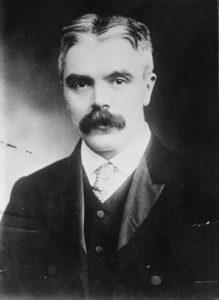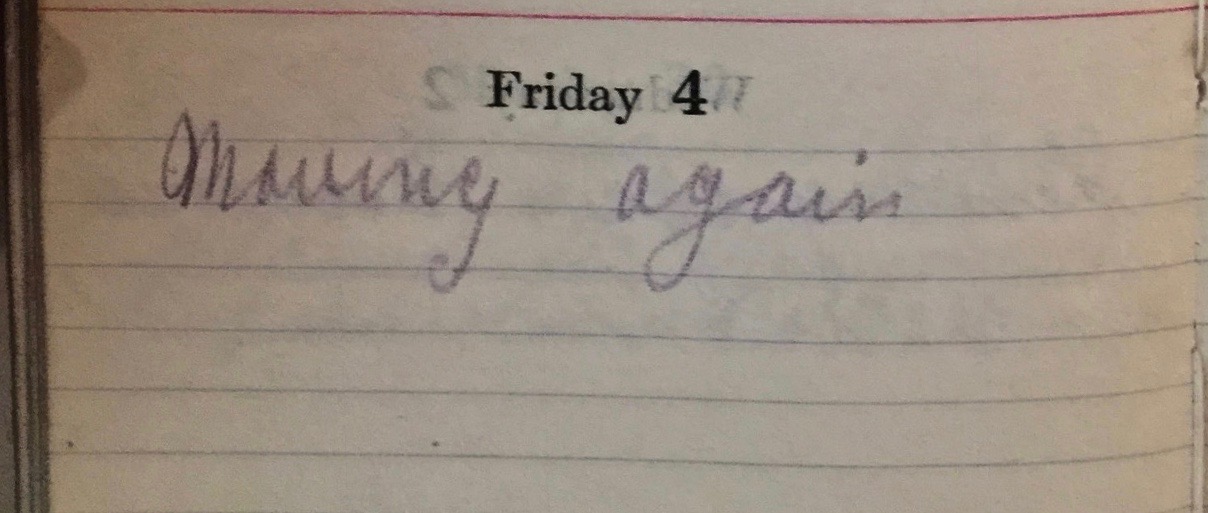Friday October 4th, 1918
Moving again.
Summer Time
According to the BWD today, ‘Winter Time’ will come into effect at 2am on October 6th.
In April 1916, Germany had been the first country in the world to use Daylight Savings Time (DST) nationwide. Its example was quickly emulated by Austria and The Netherlands and Britain followed suit just weeks later.

In late April and early May 1916 there was considerable debate about DST in both the British Parliament and the country. For example, one letter writer to The Guardian newspaper, commented:
‘… the German Government has decided to adopt the proposal, and on April 30 German clocks throughout the Empire will put forward one hour at 11pm and on October 1 the clocks will be put back an hour. Germany, whose eye for material advantage remains one of her unchallenged attributes, has stolen the march on us.’¹
He continued, ‘We can look to Parliament at present for little but the restriction of our liberties and the appropriation of our funds in the common cause. Could our lawmakers not be induced the more easily therefore to enact this measure, which, apart from the advantages it would confer on the civil population, would give us 154 hours more of effective training time, for our troops and of daylight overtime for our munitions factories. And at no expense!’¹
Apparently DST had been contemplated before the war but the bill was not passed. At the time, various objections had been raised: ‘One was that it would upset the Astronomer Royal; another that it would incommode the domestic cow; and speaking for the City, Sir Frederick Banbury pointed out that it would merely mean a host of clerks sitting in wait for their foreign correspondence.’²
Parliamentary Debate
On May 8th, 1916 it was debated again in Parliament, this time at the behest of the Government. The Home Secretary, Herbert Samuel, ‘commended the proposal solely as a war measure, designed primarily in the interests of coal economy. A saving of ‘millions rather than hundreds of thousands’ was estimated…’.³ The Bill was passed 170 votes to 2. DST was introduced for the first time at 2am on 21st May and would last until 2am on October 1st 1916.
An interesting footnote to the debate, in the same article, referenced the Home Secretary’s comments on Ireland.
‘With regard to Ireland, Irish time was twenty five minutes behind English time. It had long been thought desirable to unify the times. He did not propose that now for two reasons. It was impossible owing to recent events in Ireland to ascertain the opinion of the Irish Government and the Irish public. The matter must be considered from their standpoint, and they must wait until more normal times. Secondly the legislation proposed was for the war only.’³
Click here to read more about GMT.
Despite being introduced as a wartime measure, DST, proved so popular that it was re-named British Summer Time (BST). This reaction wasn’t universal, for example Germany abandoned the practice in 1919.
Provost Reinforcement Officer
Today Lt Brister transfers to the Third Army to become a Provost Reinforcement Officer. Provost were soldiers responsible for discipline enforcement and unit custody in the British Army. They belong to the regiment or corps in which they enforce discipline rather than the Royal Military Police or its equivalent.†
A Provost-Marshal ‘Commands the corps of military police and is responsible for their organization, efficiency and distribution.’ ‡
‘In WW1 the units which would come under his command would be the Corps of Military Foot Police, the Corps of Military Mounted Police and the Military Provost Staff Corps (MPSC). The MPSC was responsible for the detention and custody of “Soldiers under Sentence”. It would seem that men sentenced to a term of detention of 28, 56 or 112 days would be placed in a Detention Centre. Those whose sentence exceeded 112 days would go to a prison.‘†
Good luck to him.
9th Battalion War Diary – 4th October 1918 – Maricourt
Battalion marched to Moislains. T/Lt J Byrne is struck off the strength on proceeding to MG school, Grantham. Winter time will come into use on the night 5/6 October. At 01.00 hrs (1.0 am Summer Time) on 6th October the clock will be put back one hour. The following is battle order and cancels all previous instructions on this point:- Rifle and sling equipment (with pack – no haversack), mess tin, water bottle, 120 rounds SAA, steel helmet, SBR, light shovel (Inf. Pattern) or entrenching tool, cardigan, 2 pr socks, towel, soap, holdall, oil tin, iron ration one days ration, waterproof sheet.
Lt JF Brister is struck off strength on joining Third Army as Provost Reinforcement Officer.
References & Further Reading
¹ ‘Correspondence’ section in The Guardian, April 28th, 1916, page 10
² ‘Miscellany’ section in The Guardian, May 6th, 1916, page 5
³ The Guardian, May 9th, 1916, page 5
* photograph from The Library of Congress. Image may be subject to copyright.
º thread on the website of the Manchester Regiment (Manchesters.org). Quote from PhilipG.
† Regimental Police on Wikipedia
‡ ‘Field Service Pocket Book, 1914’, General Staff, The War Office, page 28
History of Time Zones in the UK on timeanddate.com



One thought on “End of Summer Time – October 4th, 1918”
Comments are closed.